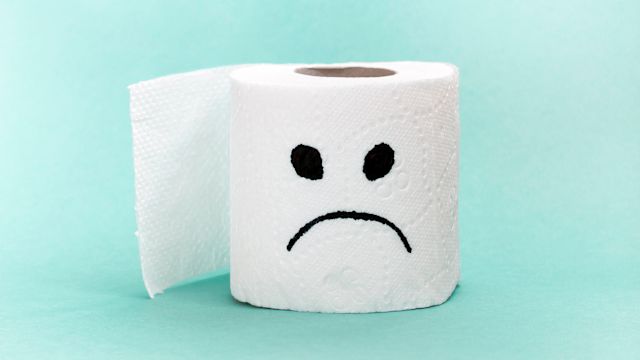Perhaps you get diarrhea once or twice a month. Could this be a sign of irritable bowel syndrome (IBS)? What about people who feel gassy more often than not? Is this IBS? And for people who cycle constantly between constipation and diarrhea, could their symptoms be a sign of something more serious?
IBS is one of the most common functional gastrointestinal (GI) disorders, but there's a lot of confusion about what it really is. One reason is that this disorder is a syndrome, which means there's no simple way to diagnose it, other than to identify the presence of IBS symptoms. These can range from frequent bloating, to occasional diarrhea or constipation, to a constant cycle of diarrhea and constipation.
IBS defined: ABC and D
Irritable bowel syndrome is a functional type of bowel disorder that results in abdominal pain and discomfort, bloating, and altered bowel habits, such as constipation or diarrhea. The reason for these symptoms is not clear. Researchers speculate that the nerves and muscles of the bowel simply function abnormally in people with the condition. Researchers also have discovered that people with IBS have altered levels of serotonin—a chemical neurotransmitter—in their bowels, which may play a role in symptoms.
The good news is that IBS does not progress to more serious diseases. The downside of having IBS is that the symptoms can make daily life difficult, disrupt special plans and be emotionally upsetting.
If you think you have IBS, you'll want to see your healthcare provider (HCP) for an evaluation and to receive help with treating the symptoms. There is no specific test for IBS; because it's a functional disorder, meaning it doesn't show up on diagnostic tests.
Also, the symptoms of IBS may be similar to symptoms of other functional GI disorders that affect the bowel, so you'll need your HCP’s help to determine exactly what's causing your problems. Other functional GI disorders include:
- Functional constipation: Also called chronic idiopathic constipation, or chronic constipation, people with this condition experience persistent symptoms of constipation (typically lasting 6 months or more), and their symptoms are not caused by another medical disorder. It is estimated that as much as 20 percent of the United States population experiences chronic constipation. Similar to IBS, altered levels of serotonin may play a role in chronic constipation.
- Functional bloating: This is bloating (a feeling of pressure and distention in the abdomen) that occurs several times a month over a period of several months, and there are insufficient symptoms for a diagnosis of IBS or other functional GI disorders. This condition occurs in about 15 percent of the population.
- Functional diarrhea: People with this condition experience frequent watery stools over a period of several months in the absence of abdominal pain or discomfort. As much as 4 to 5 percent of the population may experience this disorder.
- Functional abdominal pain syndrome: People with this condition experience pain in the abdomen or belly, but there is no known cause. The pain may be unpredictable, occurring occasionally or constantly, but the symptoms will have persisted over several months. It is estimated to affect up to 2 percent of the population.
Your HCP will use your symptoms, your medical history and a physical exam to help determine if you might have a functional GI disorder.
If your HCP decides your symptoms signal IBS, he or she may recommend certain diet and lifestyle changes as well as medications that may help ease your symptoms.
Easing IBS symptoms
You don't have to wait until your HCP visit to get some relief. There are self-care methods you can try right now to help ease your symptoms. The following list of self-care action steps may help ease some digestive troubles:
- Drink plenty of fluids.
- Eat five or six small meals daily rather than three large meals.
- Choose healthful foods and avoid high-fat foods.
- Limit alcohol, caffeine and sorbitol.
- Engage in relaxation techniques if stress is a problem.
- Take over-the-counter (OTC) and prescribed medications as directed; avoid using OTC laxatives, because prolonged use could hurt your bowel over time and lead to even poorer function.
- Get an adequate amount of fiber in your diet; aim for about 25 grams per day.
Although there's not a general IBS diet that works for everyone, avoiding certain foods has proved helpful for some people with IBS. You may want to keep a food diary to figure out which foods trigger your symptoms.
But self-care methods can only go so far. Your HCP may recommend medication to help ease your symptoms, and there are several prescription and OTC options for helping manage IBS.
When it's not IBS
Do you have symptoms that aren't on the GI Relief Symptom Checker? The symptoms below are not common symptoms of IBS but instead may signal that something else is going on medically with your gastrointestinal tract. Call your HCP right away if you experience any of these signs:
- Fever
- Anemia
- Unexplained weight loss
- A mass in the abdomen that you can feel
- Rectal bleeding
- Bloody bowel movements
Help is here
Although IBS and other functional GI disorders don't progress to more serious diseases, they may cause significant discomfort and annoyance. Fortunately, you do have options for regaining control over your bowel habits. The first step: Be open and honest with your HCP regarding your symptoms and their impact on your life. If your HCP decides you have IBS, follow your treatment plan closely. Doing so can help get you on the path to more comfortable days.





